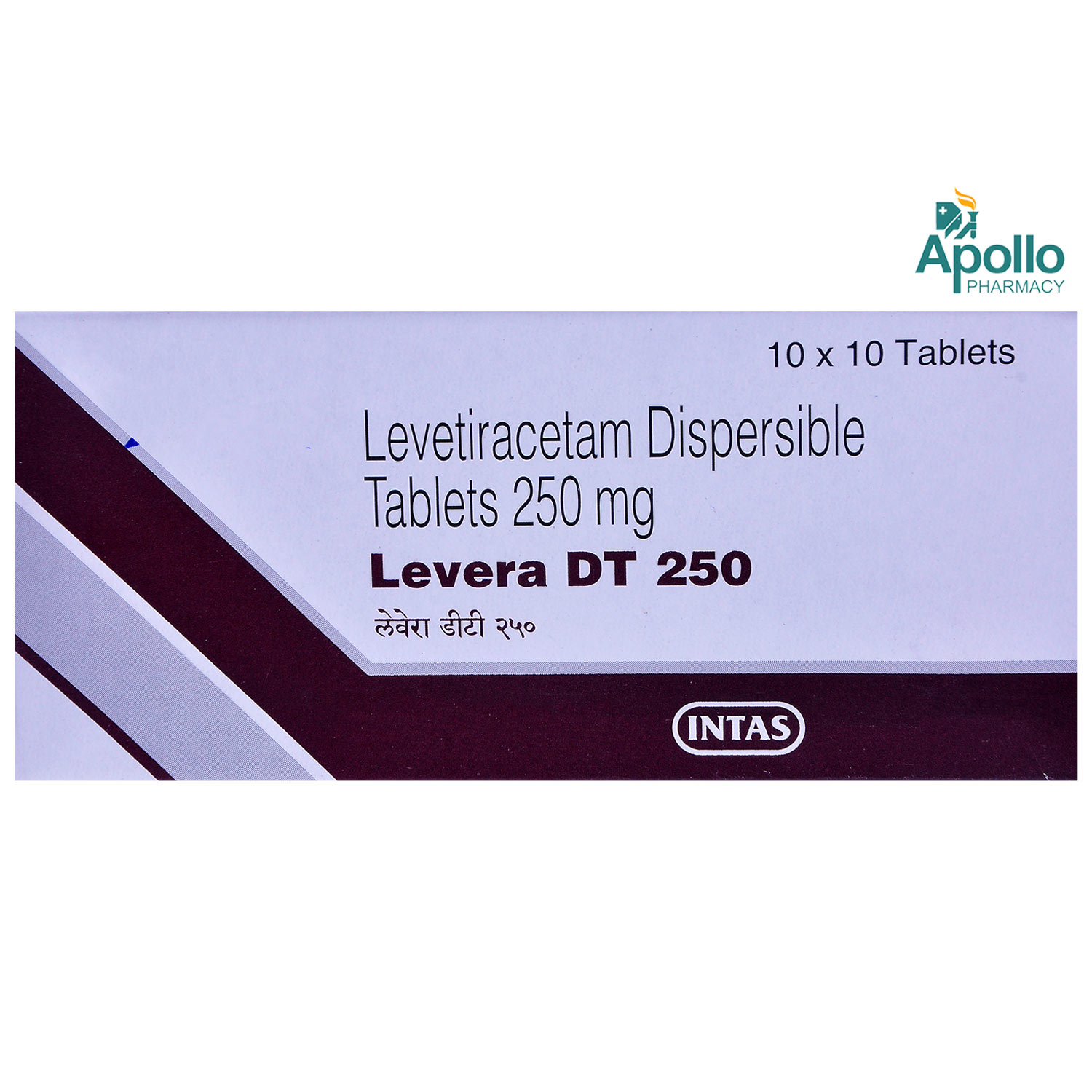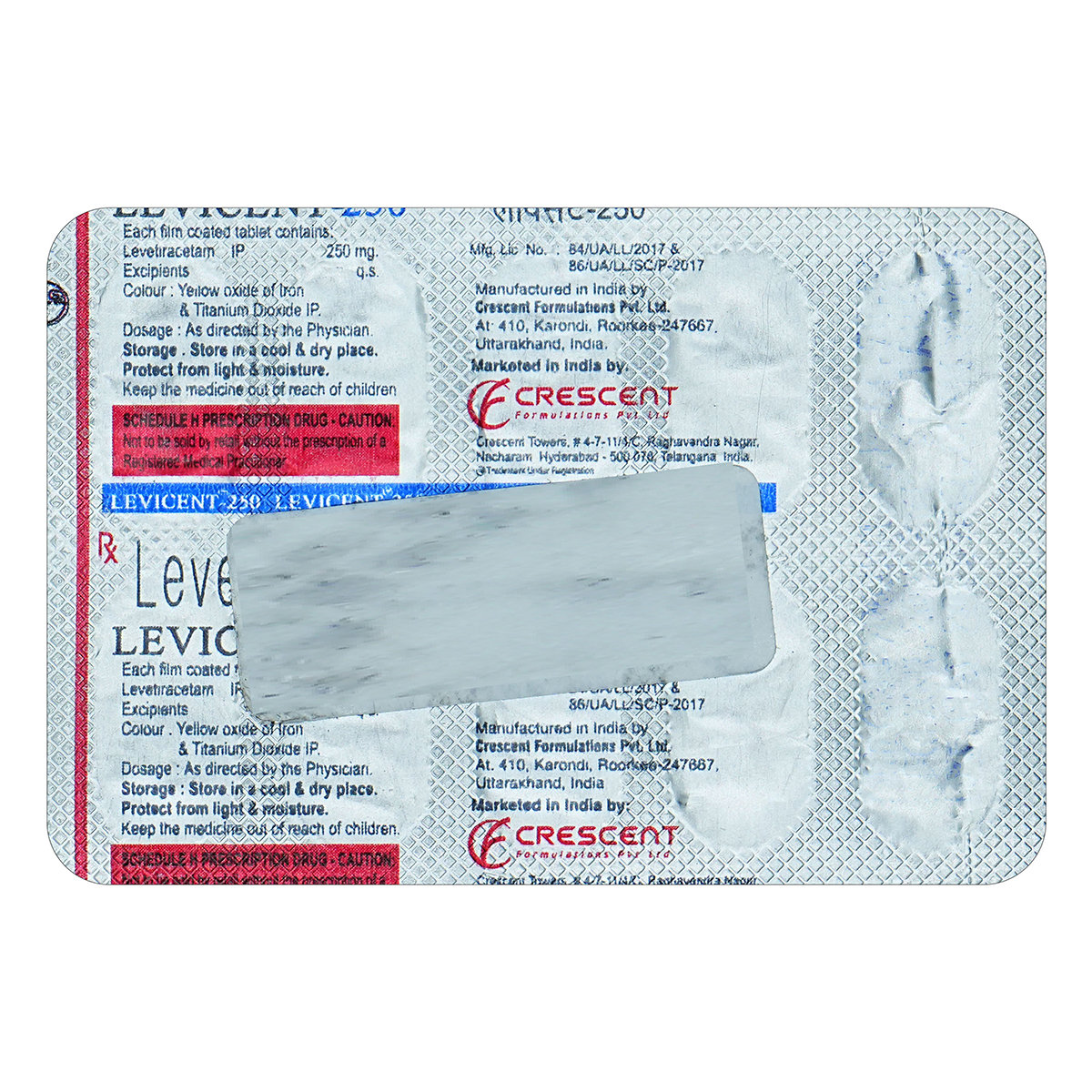Levetiracetam
About Levetiracetam
Levetiracetam is used to treat seizures (fits) due to epilepsy. Epilepsy is a chronic condition where patients have repeated fits (convulsions). It is mainly used for fits that affect only one side of the brain, but could extend to larger areas on both sides of the brain.
Levetiracetam contains Levetiracetam, which works by slowing down the abnormal signals in the brain that cause episodes of seizures. It helps by suppressing specific brain sites responsible for abnormal activity and prevents the spread of electrical signals that cause seizures.
Not everyone who is taking Levetiracetam will get these side effects. In some cases, you may experience daytime drowsiness, disturbed sleep, light-headedness, dizziness, sleepiness, general weakness, and unexplained infections. Most of these side effects of Levetiracetam do not require medical attention and gradually resolve over time. However, if the side effects are persistent, please reach out to your doctor.
Take this medication by mouth with or without food as directed by your doctor. The dosage is based on your medical condition and response to treatment. To help you remember, take it at the same time each day. Tell your doctor if your condition does not improve or worsens.
Before taking Levetiracetam, tell your doctor if you are allergic to it or any other components present in it. Inform your doctor if you have any history of kidney disease, lung disease, muscle weakness (myasthenia gravis), difficulty in sleeping (sleep apnoea), or severe liver disease. Consult the doctor if you are pregnant or planning to get pregnant. Suddenly stopping Levetiracetam can cause withdrawal symptoms like anxiety, increased heart rate, tremors, or general unwell feeling. Suicidal thoughts or actions can be caused in some patients taking Levetiracetam, so pay attention to any sudden change in mood swings, behaviour, or feeling.
Uses of Levetiracetam
• Management of Epilepsy: Levetiracetam is frequently administered to treat different kinds of seizures linked to epilepsy in both children and adults.
• Partial-onset seizures can be effectively controlled with this medication, which helps to lessen the frequency and intensity of these seizures.
• Adjunct Therapy: To improve seizure control, Levetiracetam can be taken in conjunction with other anti-epileptic medications.
• Control of Status Epilepticus: To help stabilise the patient in an emergency, Levetiracetam may be used as part of the status epilepticus management regimen.
Medicinal Benefits
- Levetiracetam contains Levetiracetam, used in combination or alone for treating symptoms of epilepsy. It works by slowing down the abnormal signals that the brain gives, leading to episodes of seizures.
- Levetiracetam helps by suppressing specific brain sites responsible for abnormal activity and prevents the spread of electrical signals that cause seizures.
- This medication helps reduce the episodes of seizures but does not cure epilepsy.
Directions for Use
- Levetiracetam can be taken with or without food as advised by your doctor.
- Follow your doctor's instructions on the dosage and timing of this medication.
- Swallow Levetiracetam as a whole with a glass of water.
- Do not crush, break, or chew it.
Storage
Side Effects of Levetiracetam
- Daytime drowsiness
- Disturbed sleep
- Dizziness
- Sleepiness
- General weakness
Drug Warnings
- Avoid taking Levetiracetam if you are allergic to it.
- Do not take Levetiracetam if you have any history of lung disease, liver disease, or glaucoma or have difficulty sleeping (sleep apnoea). Levetiracetam can cause severe allergic reactions (anaphylaxis), which can be life-threatening.
- Taking Levetiracetam with other anti-epileptic medications can cause severe drowsiness, breathing problems, coma, and death.
- Levetiracetam should be taken with extreme caution in patients with a history of alcohol or drug abuse.
- Pregnant or lactating women should consult a doctor before taking Levetiracetam, as it is generally unsafe for use in this population.
- If you think you have suicidal thoughts, difficulty concentrating, sleep disturbances, dizziness, or sleepiness, let your doctor know about this.
- Young children (especially those under 16 years) are more likely to develop behavioural changes like aggression than adults, so Levetiracetam should only be given to children if recommended by the physician and under medical supervision.
- Please visit a doctor immediately if you experience a rash, itching, trouble breathing, trouble swallowing, or swelling in your hands, face, or mouth while using this medicine.
Drug Interactions
Drug-Drug Interaction: This medicine may have interaction with antianxiety or antiepileptic medicines (carbamazepine, fluvoxamine, phenobarbital, phenytoin, primidone), anti-HIV drugs (amprenavir, ritonavir), acidity medicine (cimetidine), drugs to treat chronic alcoholism (disulfiram), anti-tuberculosis drug (rifampicin), anti-Parkinson’s drug (levodopa), and asthma drugs (theophylline).
Drug-Food Interaction: Levetiracetam may interact with multivitamins, multi-minerals, or other herbal supplements. If you are using any over-the-counter (OTC) items, please let your doctor know.
Drug-Disease Interaction: The effectiveness of Levetiracetam is affected in haemodialysis (when the kidneys are unable to perform their natural function) and anaemia (characterised by a low haemoglobin level). Also, obese people (with a BMI greater than 25) should consult a doctor before taking Levetiracetam.
Drug-Drug Interactions Checker List:
Safety Advice

Alcohol
unsafeYou are recommended not to consume alcohol along with Levetiracetam to avoid unpleasant side-effects like drowsiness, dizziness, or sleepiness. It may also lead to a life-threatening condition like coma if taken with excessive alcohol.

Pregnancy
unsafeLevetiracetam is a Category C risk pregnancy drug that is considered unsafe for pregnant women. Levetiracetam can have some harmful effects on the baby (fetus), so your doctor will weigh the benefits and any potential risks before prescribing it to you.

Breast Feeding
unsafeLevetiracetam passes into breast milk and may affect the baby's health. So, inform your doctor if your are breastfeeding before starting the treatment.

Driving
unsafeLevetiracetam usually causes dizziness, drowsiness, and visual disturbances, which may affect their ability to drive or operate machinery. So, do not drive or operate heavy machinery if you feel sleepy or dizzy after taking Levetiracetam. Tell your doctor if you experience any of these side effects.

Liver
cautionLevetiracetam to be taken with caution, especially if you have a history of liver disease. The dose may have to be adjusted by your doctor.

Kidney
cautionLevetiracetam to be taken with caution, especially if you have a history of kidney disorders. The dose may have to be adjusted by your doctor. Do not give Levetiracetam to dialysis patients and kidney failure patients.

Children
unsafeIt is not known whether Levetiracetam is safe or effective in treating conditions like panic disorder in children younger than 18 years old. So, your doctor will decide whether Levetiracetam can be given to the children less than 18 years of age or not.
Habit Forming
Diet & Lifestyle Advise
- Engage in regular exercise, which can help lower anxiety by releasing endorphins and improving your sleep and self-esteem.
- Find humour in your daily life. Try to watch light-hearted shows to help relieve stress.
- You can try increasing your mindfulness by including yoga, meditation, mindfulness-based cognitive therapy, and mindfulness-based stress reduction.
- Drink enough water to stay hydrated, and limit or avoid alcohol and caffeine to relieve anxiety.
- Include a diet rich in whole grains, vegetables, and fruits. This is a healthier option than eating a lot of simple carbohydrates found in processed foods.
- Reduce your intake of alcohol, caffeine, added sugar, salt, and fat. Especially trans-fat may help also help reduce inflammation.
- You can include antioxidants in your daily diet, such as ashwagandha, omega-3 fatty acids, green tea, and lemon balm.
- Try to spend time with your friends and family. Having a strong social network may help you lower your risk of anxiety.
Patients Concern
Disease/Condition Glossary
Epilepsy: Epilepsy is a brain-related chronic disorder characterised by episodes of seizures (fits). In this condition, a chemical change in brain cells (neurons) leads to a sudden rise in electrical activity (impulse) in the brain, followed by sudden, jerky movements of limbs or a body part. This disease cannot be cured, but it can be managed.
FAQs
Levetiracetam is used to treat seizures (fits) due to epilepsy.
Levetiracetam works by slowing down the abnormal signals in the brain which cause episodes of seizures.
There is no clinical evidence that Levetiracetam affects fertility in either men or women. But, if you are trying to get pregnant, consult your doctor.
Do not stop taking Levetiracetam until instructed by your doctor. You may get side effects like confusion, depression, nervousness, sweating, and diarrhea. Your doctor may lower the dose of Levetiracetam if using it for more than 2-4 weeks of treatment to reduce side effects.
Levetiracetam is prescribed for the long term when used for epilepsy. So, if Levetiracetam is prescribed for more than 4 weeks, your doctor may reduce the dose before stopping it completely to prevent withdrawal symptoms.
Yes, if you feel unexpected puberty or slowing in growth, please consult your doctor and do as your doctor advises.
No, even if you feel better, you should not stop the medication without consulting your doctor as this might increase the episodes of seizures.
Caffeine is a stimulant that may reduce the calming effects of Levetiracetam. So, it is advisable to avoid caffeine intakes like coffee, tea, cola, or chocolate containing caffeine.
Yes, Levetiracetam may cause weight gain as an uncommon side effect. Follow a healthy diet and exercise regularly to maintain proper weight. Talk to the doctor if you have any concerns.
Levetiracetam might take a few weeks to begin working. You may still have seizures during this time.
Levetiracetam should be taken for as long as it has been prescribed by the doctor. The duration of treatment depends on your condition and response to the treatment.
Levetiracetam does not cause addiction as it is not a habit-forming medicine.
An overdose of Levetiracetam may cause sleepiness, aggression, agitation, decreased alertness, breathing problems, and coma. Consult the doctor if you have exceeded the recommended dose of Levetiracetam.
Levetiracetam should be discontinued gradually to prevent an increase in seizures. Consult the doctor if you have any concerns, the doctor will recommend gradual withdrawal of Levetiracetam.
Yes, Levetiracetam may cause sleepiness as a side effect. Therefore, avoid driving, operating heavy machinery or doing any activities that require alertness unless you know how this medicine affects you.








